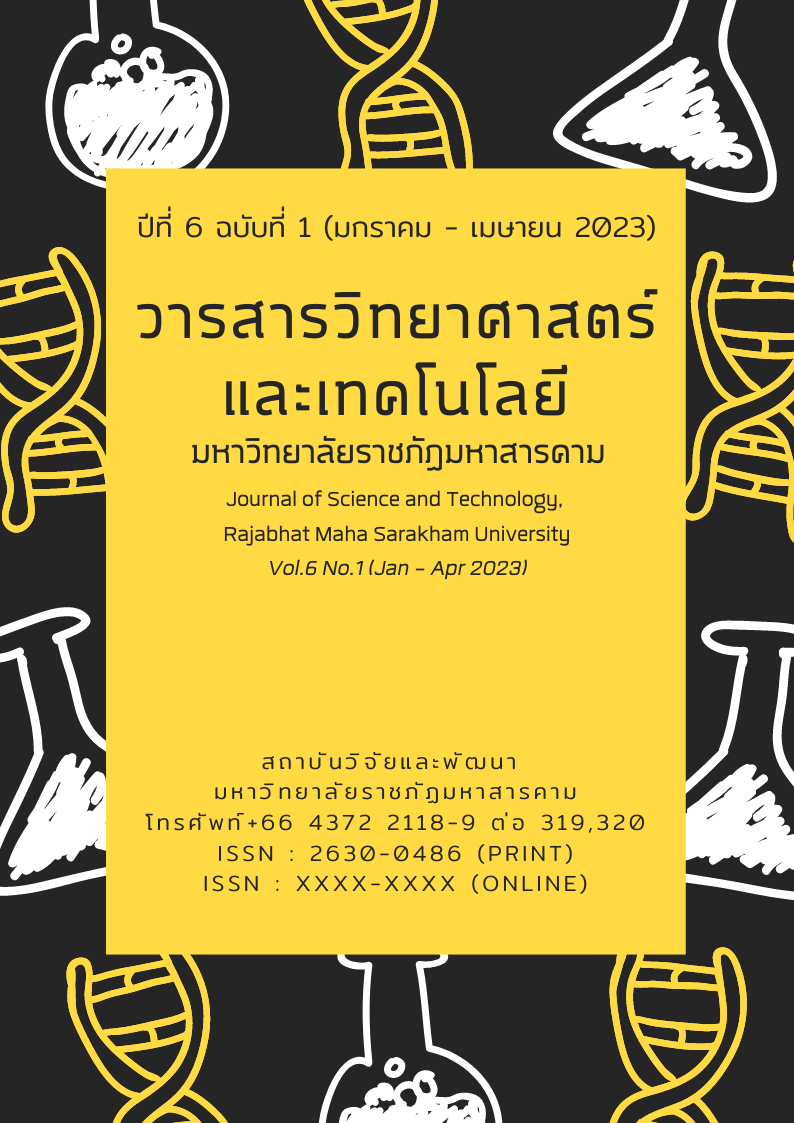The Spray Dryer Optimization Factor for Yanang Process in small enterprises
Keywords:
Spray Dryer, Optimize Factor, YanangAbstract
This research aim to optimizing factor proceed in spray dryer for Yanang processing into powder products. That the results of water solubility, color measurement, free water activity (aw), biological properties and general characteristics, odor, Maltodextrin-De 10 added until the soluble solid content was 25 percent significantly at 0.05 level. The optimum solution of the spray dryers was 48 grams per hour at 135°C and a flow rate of 1000 ml per hour.
References
Ahmed, M., Sorifa A.M., Lee J.C., Eun B.J. (2010). Encapsulation by spray drying of
bioactive components, physicochemical and morphological properties from
purple sweet potato. Food Science and Technology, 43(9), 1307-1312. https://doi.org/10.1016/j.lwt.2010.05.014
Ahmed, S., Al-Sad i J., Saeed U., Rizvi G., Ross D., Clarke, R., Price J. (2015). Process
optimization through designed experiments to achieve consistency in output color of a compounded plastic grade. Quality Engineering, 27(2), 144–160. https://doi.org/10.1080/08982112.2014.927485.
Akella, A. K., Saini, R. P., & Sharma, M. P. (2009). Social, economical and environmental
impacts of renewable energy systems. Renewable Energy, 34(2), 390–396. https://doi.org/doi:10.1016/j.renene.2008.05.002
AOAC. (2000). Official Methods of Analysis. (17th Edition.). The Association of Official
Analytical Chemists, Gaithersburg, MD, USA. Methods.
Nurhadi, B., Roos, Y. H., & Maidannyk, V. (2016). Physical properties of maltodextrin DE 10: Water sorption, water plasticization and enthalpy relaxation. Journal of Food Engineering, 174, 68–74. https://doi.org/10.1016/j.jfoodeng.2015.11.018
Dinçer, İ., Zamfirescu C. (2016). Drying phenomena: theory and applications. Intergovernmental panel on climate change, Drying Phenomena: Theory and Applications. (1st ed.). Cambridge University Press.
Fiaschi, D., Manfrida, G., Russo, L., & Talluri, L. (2017). Improvement of waste heat recuperation on an industrial textile dryer: Redesign of heat exchangers network and components. Energy Conversion and Management, 150, 924–940. https://doi.org/10.1016/j.enconman.2017.05.053
Caglayan, H., & Caliskan, H. (2017). Sustainability assessment of heat exchanger units for spray dryers. Energy, 124, 741–751. https://doi.org/10.1016/j.energy.2017.02.097
Koech, L., Rutto, H., Lerotholi, L., Everson, R. C., Neomagus, H., Branken, D., & Moganelwa, A. (2021). Spray drying absorption for desulphurization: a review of recent developments. Clean Technologies and Environmental Policy, 23(6), 1665–1686. https://doi.org/10.1007/s10098-021-02066-3
Kunapornsujarit, D., Intipunya P. (2013). Effect of spray drying temperature on quality of longan beveragepowder. Food and Applied Bioscience Journal, 1(2), 81-89. https://li01.tci-thaijo.org/index.php/fabjournal/article/view/77366
Malamatari, M., Charisi, A., Malamataris, S., Kachrimanis, K., & Nikolakakis, I. (2020). Spray
Drying for the Preparation of Nanoparticle-Based Drug Formulations as Dry Powders for Inhalation. Processes, 8(7), 788. https://doi.org/10.3390/pr8070788
Mujumdar, AS. (2015). Handbook of industrial drying. (4th ed.). Boca Raton; London; New York: CRC Press: Taylor & Francis.
Pawaree, N., Khokhajaikiat, P. (2009). Productivity Improvement by Using Design of Experiment: Case Study of Cotton Bud Factory in Khonkaen Province. KKU Engineering Journal, 36(3), 241-249. https://ph01.tci- thaijo.org/ index.php/easr/ article/view/1766
Patel, S. K., & Bade, M. H. (2020). Energy targeting and process integration of spray dryer with heat recovery systems. Energy Conversion and Management, 221, 113-148. https://doi.org/10.1016/j.enconman.2020.113148



